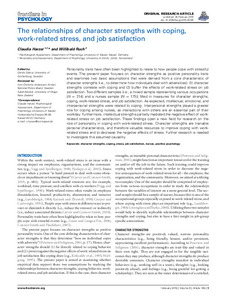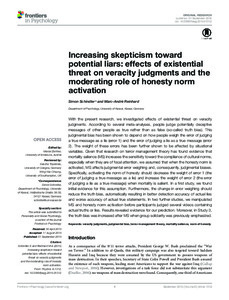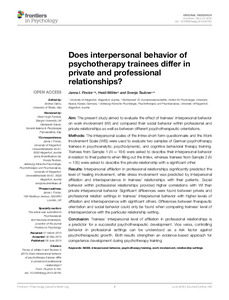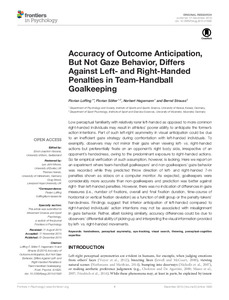Suche
Anzeige der Dokumente 1-4 von 4
Aufsatz
 The relationships of character strengths with coping, work-related stress, and job satisfaction
The relationships of character strengths with coping, work-related stress, and job satisfaction
(2015)
Personality traits have often been highlighted to relate to how people cope with stressful events. The present paper focuses on character strengths as positive personality traits and examines two basic assumptions that were derived from a core characteristic of character strengths (i.e., to determine how individuals deal with adversities): (1) character strengths correlate with coping and (2) buffer the effects of work-related stress on job satisfaction. Two different samples (i.e., a mixed sample representing various ...
Aufsatz
 Increasing scepticism toward potential liars: effects of existential threat on veracity judgments and the moderating role of honesty norm activation
Increasing scepticism toward potential liars: effects of existential threat on veracity judgments and the moderating role of honesty norm activation
(Frontiers Research Foundation, 2015)
With the present research, we investigated effects of existential threat on veracity judgments. According to several meta-analyses, people judge potentially deceptive messages of other people as true rather than as false (so-called truth bias). This judgmental bias has been shown to depend on how people weigh the error of judging a true message as a lie (error 1) and the error of judging a lie as a true message (error 2). The weight of these errors has been further shown to be affected by situational variables. Given ...
Aufsatz
 Does interpersonal behavior of psychotherapy trainees differ in private and professional relationships?
Does interpersonal behavior of psychotherapy trainees differ in private and professional relationships?
(2015)
• Aim: The present study aimed to evaluate the effect of trainees’ interpersonal behavior on work involvement (WI) and compared their social behavior within professional and private relationships as well as between different psychotherapeutic orientations.
• Methods: The interpersonal scales of the Intrex short-form questionnaire and the Work Involvement Scale (WIS) were used to evaluate two samples of German psychotherapy trainees in psychoanalytic, psychodynamic, and cognitive behavioral therapy training. Trainees ...
Aufsatz
 Accuracy of outcome anticipation, but not gaze behavior, differs against left- and right-handed penalties in team-handball goalkeeping
Accuracy of outcome anticipation, but not gaze behavior, differs against left- and right-handed penalties in team-handball goalkeeping
(Frontiers Research Foundation, 2015)
Low perceptual familiarity with relatively rarer left-handed as opposed to more common right-handed individuals may result in athletes' poorer ability to anticipate the former's action intentions. Part of such left-right asymmetry in visual anticipation could be due to an inefficient gaze strategy during confrontation with left-handed individuals. To exemplify, observers may not mirror their gaze when viewing left- vs. right-handed actions but preferentially fixate on an opponent's right body side, irrespective of ...




